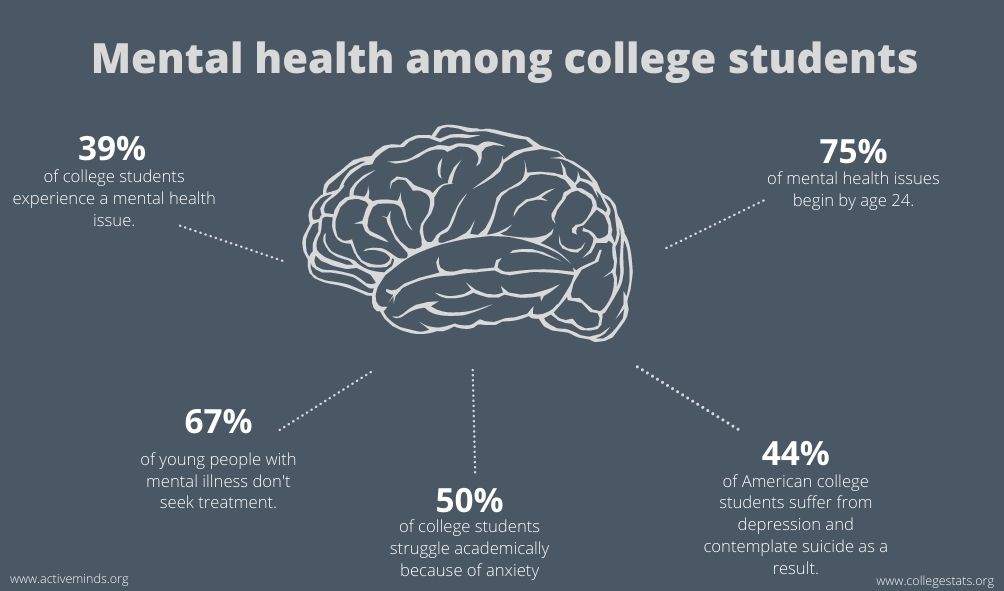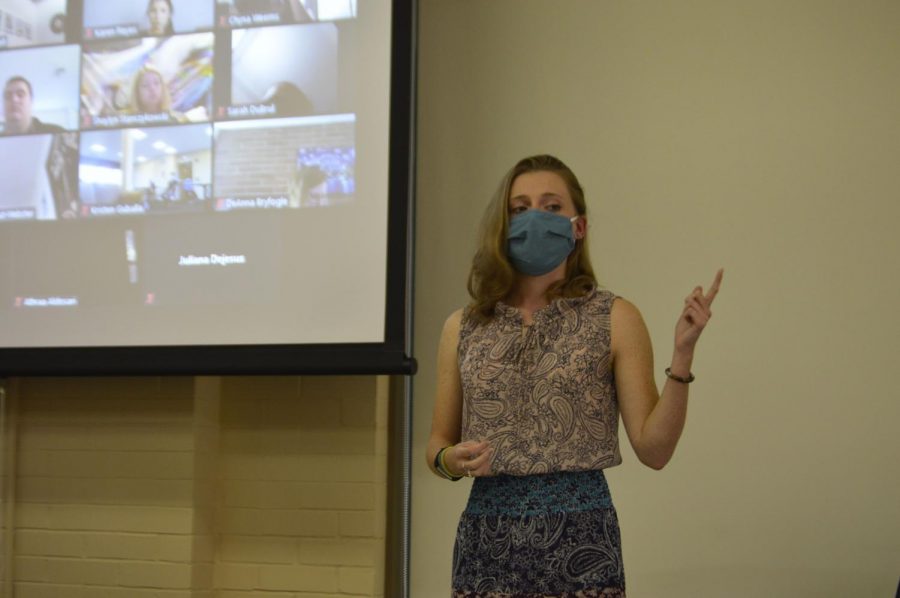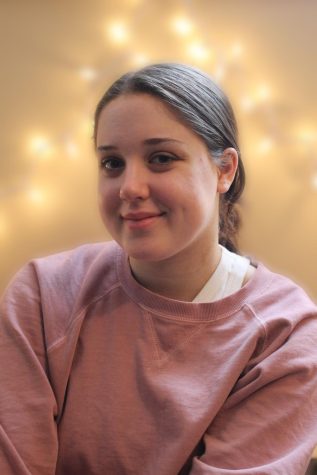Speaking to Suicide event brings awareness
Student-led panel preaches importance of vulnerability with mental health struggles
Alicia Fenton, junior physical therapy major, speaks to a those in attendance at Thursday’s Speaking to Suicide panel. The panel, held both in person and on Zoom, focused on the importance of mental health and seeking help.
September 15, 2020
September is National Suicide Prevention Month, during which the call to bring more awareness to and engagement in the conversation surrounding suicide sounds.
In order to foster more of this conversation, Active Minds on Thursday hosted the Speaking to Suicide panel on the first floor of the Center for Advanced Engineering.
The event, organized by senior social work and theology major Justin Johnson and junior physical therapy major Alicia Fenton, was attended by over 60 students and faculty, some of whom participated via Zoom.
To provide a clinical perspective, Alyson Eagle, a staff therapist at the Health and Counseling Center, spoke along with Johnson and Fenton.
All three panel members discussed personal experiences with suicide and related ways to not only bring more awareness to the topic, but more empathy as well.
At the beginning, Johnson discussed his experiences with a loved one who died by suicide. He also shared ways to be more mindful of those who have lost someone to suicide.
“If you know someone who has lost someone to suicide, just be there for them,” Johnson said.
Next, Eagle shared her perspective and experiences as a mental health professional and counselor. While she loves her job and experiences immense fulfillment, it can be difficult when dealing with these types of heavy topics.
Eagle said that the hardest part of her job is the knowledge that members of the Gannon student body experience suicidal thoughts regularly. However, she is committed to being a source of support and positivity on campus.
“I really want to take people from the darkest parts of who they are and what they’re experiencing and offer them hope,” Eagle said.
“I will walk with you in this journey and try to provoke some sort of positivity and enjoyment in life.”
Eagle also stressed the importance of engaging in self-care. Not only is self-care imperative for individual mental health, but it is also essential before one is able to help others.
She offered multiple strategies for practicing self-care as college students, when oftentimes it can seem impossible to carve out time in a busy schedule.
“You can’t pour from an empty cup,” Eagle said. “My challenge to you is to shift the language surrounding suicide, to combat the stigma associated with mental health, but to also take care of yourself.”
As the event progressed, a recording of junior social work major Katie Dickey performing an original poem was shared. Titled “The Day the Fear Almost Won,” the piece chronicled Dickey’s own experiences and captured with words the abstract concept of mental illness.
“You are here… and that is so much more than enough,” Dickey said.
Fenton continued the panel by sharing her experiences dealing with a friend’s suicide attempt. She expressed that while she once felt like her experience was not as important, she has since learned that her emotions are justifiable.
“Your experiences are valid,” Fenton said. “The pain you feel from losing someone or experiencing your own thoughts, no matter what it looks like, the way you feel is valid.”
Fenton also conveyed her gratitude for the Gannon family, especially during such a difficult time. Not only has she made friends through Gannon that have become family, but also Gannon has offered her an opportunity to safely and impactfully share her story and experiences regarding mental health and suicide. The opportunities and support systems like the Speaking to Suicide Panel here at Gannon are lifesaving, according to Fenton.
“Gannon’s given me the opportunity to heal,” Fenton said. “To be able to be vulnerable and honest with 60 people that I don’t know, but still feel safe to tell my story.”

Eagle agrees that the support surrounding mental health at Gannon is extraordinary.
“You all take care of each other, encourage each other to go to therapy and to come get help if you need it, and that’s beautiful,” Eagle said. “In the two years I’ve been working here, I’ve seen a huge shift in the stigma surrounding mental health.”
Following the panel’s sharing of their individual experiences, the conversation opened up to all attendees. Everyone received the opportunity to ask questions, share thoughts or share their support.
Freshman psychology major Sophia Skrzypczak felt the impact of the conversation and felt impressed with the level of vulnerability expressed at the event.
“Overall, I learned that it is OK to seek help, accept that any mental illness one might be facing and to never be afraid to reach out to people, but also be there for people who are struggling as well,” Skrzypczak said.
“This panel really gave me a sense of peace knowing that I can turn to people and it is OK to be vulnerable at times.”
At the conclusion of the event, Eagle called for a continuation of these difficult conversations and the safe environments in which they are held.
“Can we generalize these kinds of conversations to social injustice? Racial injustice?” Eagle said. “These are really tough conversations to have and I appreciate what a beautifully safe environment this is to have such a vulnerable conversation.”
The Speaking to Suicide Panel was a testament to the solidarity and compassion of the Gannon community, according to Eagle.
It was a beautiful expression of hope and support, and the ability of those present to participate vulnerably in a difficult conversation speaks volumes of the Gannon family.
“To create a space where 60 students are taking up a Thursday night to have a really heavy conversation, this is pretty special,” said Eagle. “I don’t think this is happening on too many other campuses.”
ANNA MALESIEWSKI







Harold A Maio • Sep 16, 2020 at 11:45 am
To combat the stigma “associated with” mental illness, you have to begin by addressing those taught and teaching it.
Have you?